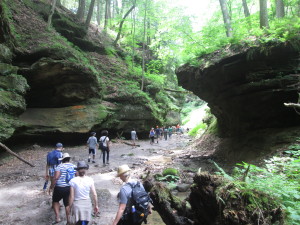by Jasmine Hamilton (2014 Byron Fellow) 
The culture of Byron, which I experienced as imagination, enthusiasm and openness, encouraged me to freely share some of my aspirations and challenges as a scientist. I remember sharing my struggles with accepting the current market-driven values that underpin much of academia and global health policy, and my interest in creating space for a more just system to emerge. I also shared the longing I have to bridge the gap between my South American/Caribbean origin and the needs existing there, with the research priorities set in Canada, where I work. In each conversation, I was motivated to continue believing that the values of academia and research can shift and that I can actively participate in that transformation. I also felt as though my dream was a noble, valid one to have.
After leaving Indiana in May, where I was surrounded by devoted visionaries, challenged to think about place both geographically and vocationally, and challenged to become my vision as opposed to passively longing for it, I landed in Geneva, where it felt as though everything that I learned at Byron was fiercely challenged. It felt like I had moved from a really great place to a really challenging one; like moving from a mountain to a valley, so to speak.
I experienced Geneva as an intense city. As the place from which most policies in health originate, my mind was always stimulated and the possibilities for constructive dialogue around values in health and governance were endless. I had many amazing, interesting conversations with many experts about everything research and health related. This was very fulfilling! But I also had some of the most difficult conversations about policy, race, disease eradication and social justice that I could ever imagine. Many of those conversations ended in frustration because “people just didn’t see clearly”, I would tell myself. I was so often tempted to assimilate and argue to get my point across, as opposed to being open and welcoming.
I remember being especially provoked in one instance when discussing the influence of economics and race on the current HIV statistics. My view of what the problems and solutions were contrasted significantly with those of my colleague and I found this to be disconcerting. My initial attempt at resolution focused more on the facts of the situation and less on the type of dialogue and future that I wanted to create. At the end of the conversation, what I (or we) had created felt more like tension and discomfort. I was challenged and humbled by this for weeks. This and similar experiences reminded me of the myriad discussions and stories that were shared at Byron about the link between how we converse and the quality of our relationships.
Thankfully, Indiana was the last memory I made before arriving in Geneva so it was easy for me to identify and walk away from the ways of being that were inconsistent with the vision of openness and accountability that I shared. I continually reflected on my conversations and the challenge of “being” that I was given at Byron. I would literally grab my journal and read some of the notes I made, reflect on the conversations that I’d had at Turkey Run and remember the ones that I promised my Byron peers that I would have after I left. This gave me the humility and strength I needed to re-frame (or begin reframing) some of those conversations and continue my dialogue with this person.
I consider living from the inside out to be the most difficult option because it challenges me to demonstrate a system of values which contradict those that I see around me. As a researcher interacting with the politics of performativity and top-down approaches, I think that I will always be faced with the temptation to assimilate into the culture of self-promotion because naturally, this is the less frictional way. But as the days go by and my vision continues to grow, this temptation is fading faster each time.
In many ways Byron provided a unique setting of encouragement, freedom and life, which reset my mind on transformation and possibility. I feel somewhat re-calibrated by the fellows, mentors and the dynamic nature of the experiences that I had at Byron. I am especially encouraged by what has emerged in and through many of us since our time in Indiana. Today more than ever my heart longs to create a new type of dialogue about values in science, research and health. Regardless of how difficult a conversation may be or how daunting my vision may seem, I am committed to becoming more like the vision that I shared.
